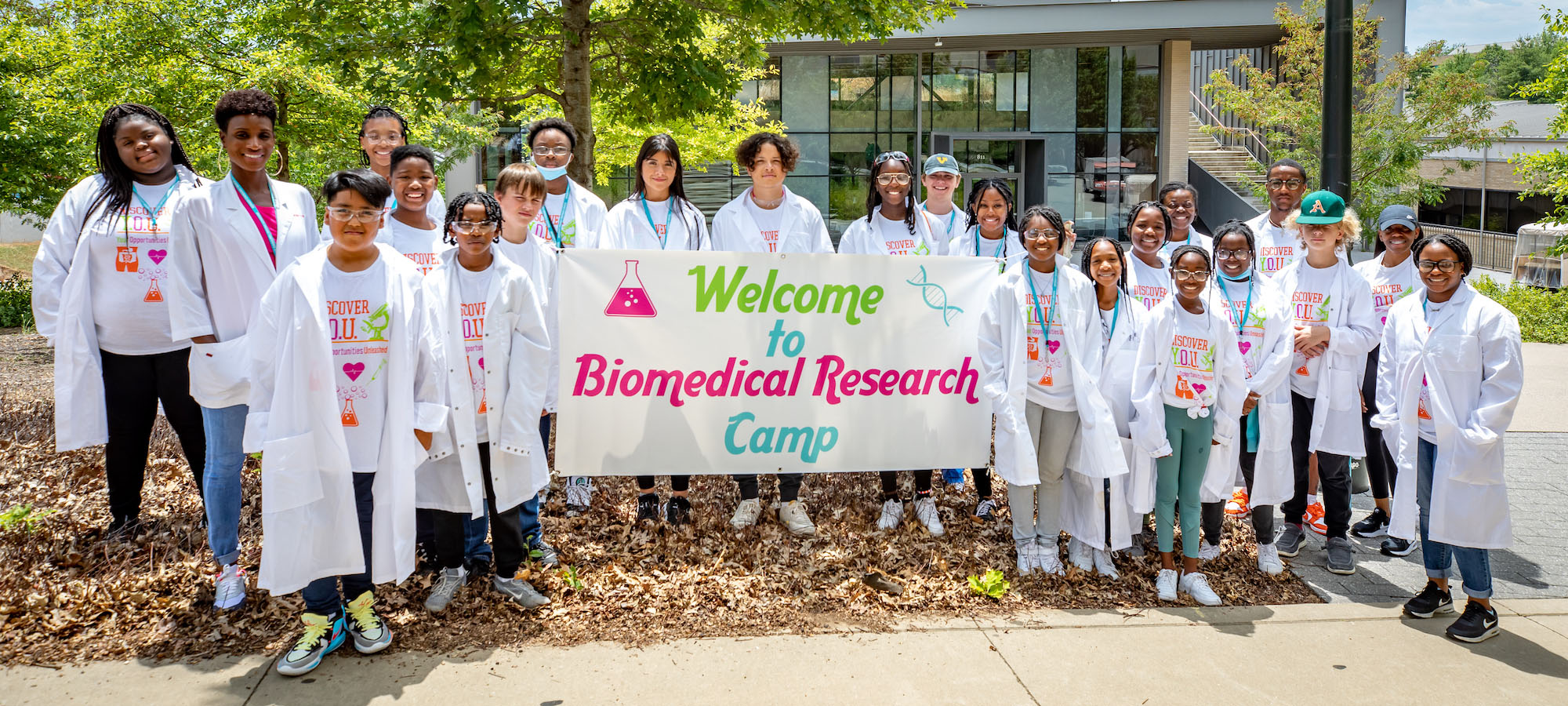
Full STEAM Ahead
Tameka Bailey has always had a curious nature, and as a child, she questioned everything around her. “I always wondered how life happens,” she said. “How do we get butterflies? How do frogs come about?”
Bailey, who grew up in the small town of Gould in the Arkansas Delta, channeled that curiosity into her studies, eventually earning a doctorate from the University of Arkansas in cell and molecular biology and returning to the U of A to teach and conduct research. As an assistant professor in biological sciences, she now works on the front lines of the war against cancer, inspires students in the classroom and leads a biomedical research camp for young people from the Delta who may or may not have considered a career in science.
 Why the Arkansas Delta? Bailey believes the Delta offers untapped resources, and
“STEM exposure opens the window of opportunity to explore ways to develop the community.”
Why the Arkansas Delta? Bailey believes the Delta offers untapped resources, and
“STEM exposure opens the window of opportunity to explore ways to develop the community.”
Her biomedical research camp, in particular, is her pride and joy. Bailey started it for the benefit of students in Gould and the neighboring community of Dumas and has seen her efforts come full circle, as students from her inaugural class have gone on to enroll at the U of A and embrace the life-changing opportunities introduced to them by her outreach.
“As an underrepresented minority within the STEM disciplines, it’s very important to me that we change the demographic – the representation that’s within those disciplines,” Bailey said. “I want to connect the two communities – my home in Fayetteville and my native home of Gould and Dumas. For me, growing up, opportunity was everything. Had I not been exposed to STEM very early on, I would not have become a research scientist.”
“I want to connect the two communities – my home in Fayetteville and my native home of Gould and Dumas.”
The Gift of Education
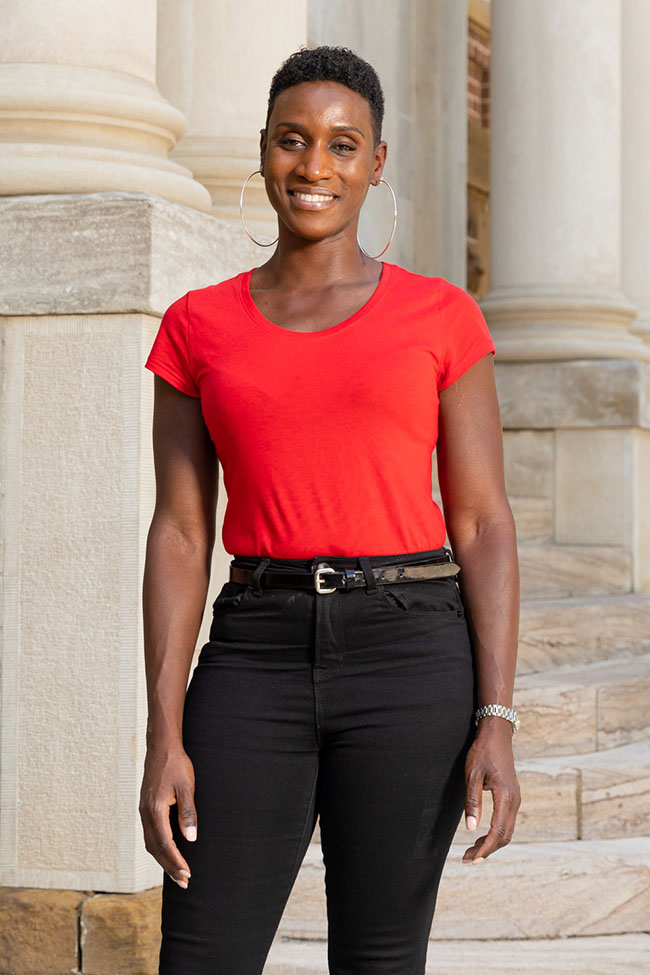
Bailey beams with pride when she talks about her childhood and her parents’ dedication to work, family, and their shared dream that she and her brother would find success through education. They worked multiple jobs to ensure Bailey and her brother had everything needed to succeed in school. Her father worked a full-time factory job and a part-time custodial job at the high school at night.
Bailey remembers joining him some nights to help, so he could get home and they could all spend time together. She smiles when she recalls that she always had fresh clothes for school while her father would patch up his worn-out clothes to wear year after year.
“He sacrificed for us,” she said.
They did everything they could to feed their young scientist’s budding curiosity, spending hours at the library looking for books to answer her many questions and borrowing encyclopedias from neighbors.
Bailey’s high school biology teacher recognized her potential and recommended she attend college to further her passion for biology. This inspired not only a lifelong pursuit for the subject but also planted a seed for how she could inspire others in the future.
Bailey wanted to come to the U of A but felt it was unlikely because of the distance between the campus in Fayetteville and her hometown, so she chose the University of Arkansas at Pine Bluff for her undergraduate studies. There, she met fellow female scientists who inspired and encouraged her to pursue her doctorate.
But this was never just about a diploma. For Bailey, it was a path to fulfilling a promise and helping to build a better world – specifically for those battling cancer. After visiting her grandmother, whose sister died from breast cancer, Bailey made it her mission in life to find a cure.
Opportunity is Everything
The University of Arkansas became the place where Bailey envisioned herself improving lives.
“The campus was so beautiful, and I said to myself, ‘I have to go here!’” she said. On her visit to campus, she met Douglas Rhoads, professor of biological sciences and the director of the interdisciplinary graduate program in cell and molecular biology. When they talked, he told her that the U of A was the place she belonged.
“The ongoing mentorship that I received from Dr. Rhoads changed the trajectory of my life,” Bailey said. “He understood that as an underrepresented minority from rural Arkansas, I would need extensive and engaging mentorship to be successful in the program. He challenged me to excel in graduate school, and he had high expectations for me. After I graduated from the U of A, he helped me find my first job, advised me through my postdoc and has been instrumental in my career development now as a faculty member. I wouldn’t be here without the generosity, wisdom and compassion of Dr. Rhoads.”
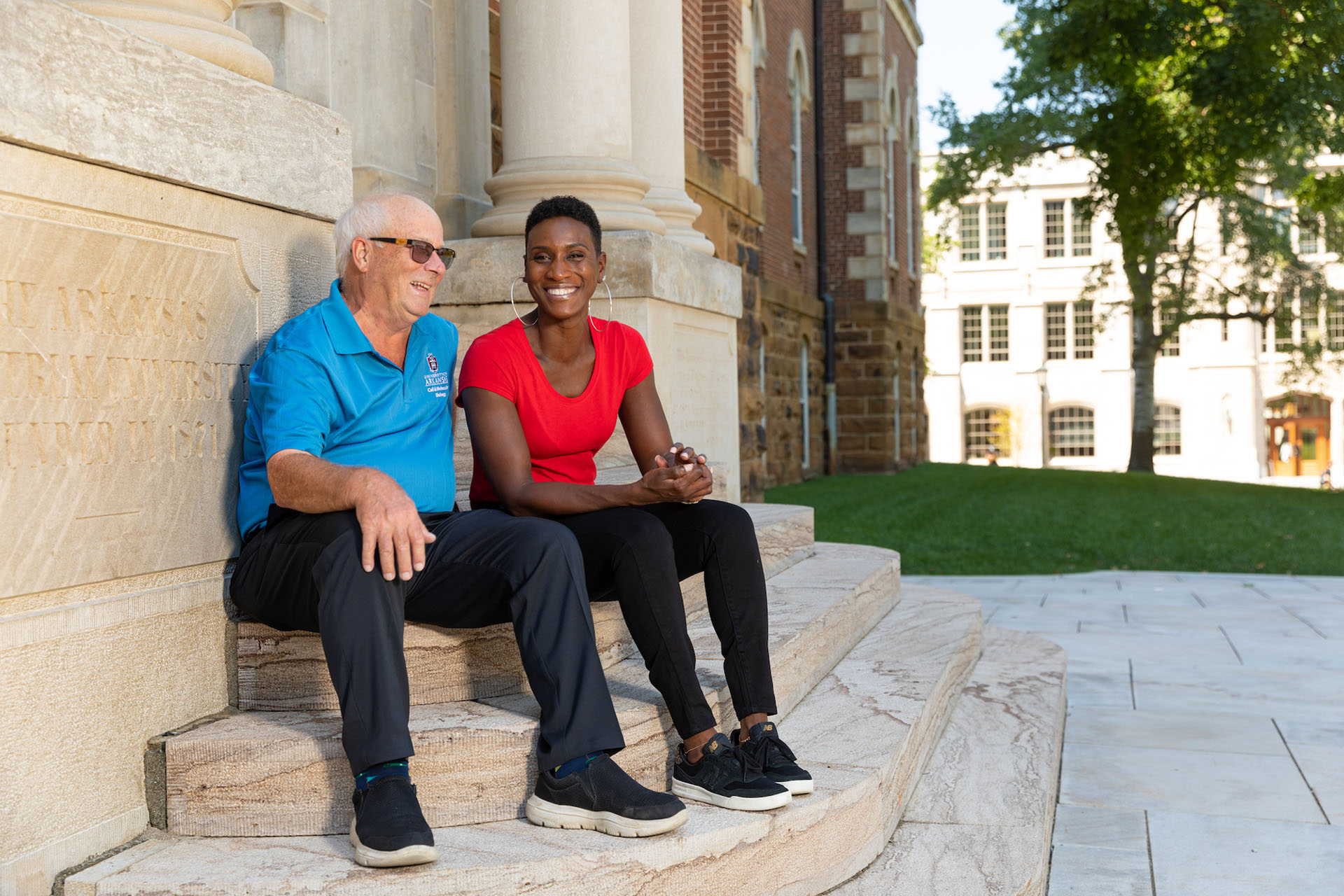
 In 2021, Rhoads and his wife, Marsha, made a planned gift to create the Rhoads Endowed
Graduate Assistantship, so more students from underrepresented backgrounds can pursue
graduate degrees in Cell and Molecular Biology from the U of A.
In 2021, Rhoads and his wife, Marsha, made a planned gift to create the Rhoads Endowed
Graduate Assistantship, so more students from underrepresented backgrounds can pursue
graduate degrees in Cell and Molecular Biology from the U of A.
In her role in the Fulbright College of Arts and Sciences, Bailey researches triple-negative breast cancer, a rare but particularly aggressive type that metastasizes from the primary tumor directly to the brain. She is looking at specific proteins for the pathway used by the cancer cells to move from breast tissue and colonize in the brain, to stop the cells from spreading.
She’s also a beloved teacher, whose calm demeanor and extensive knowledge help her students understand the most difficult of concepts.
Devon Hoehn, a pre-med student, said, “Dr. Bailey is one of my favorite teachers I have. She really wants you to understand the material and succeed in her class.”
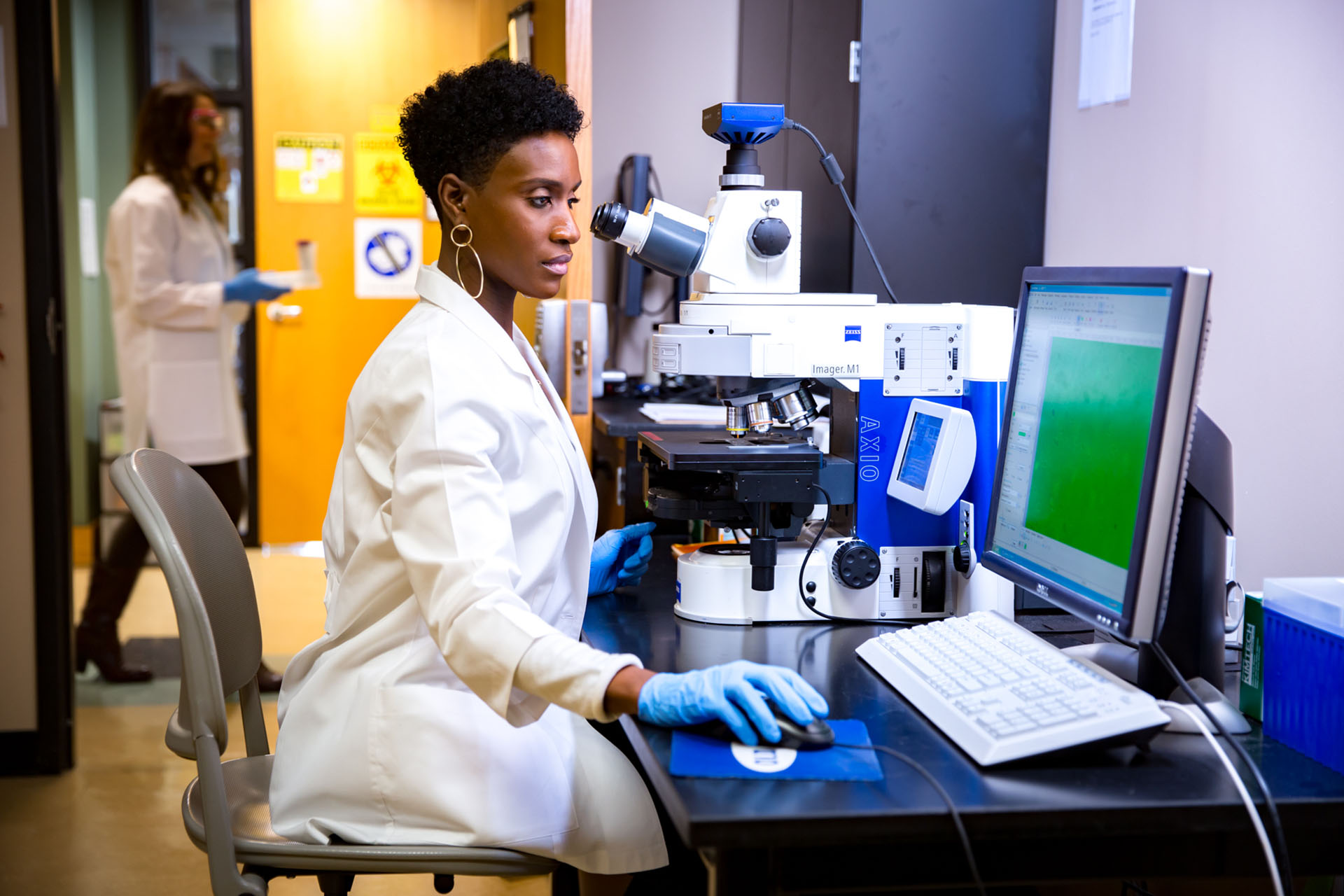
Summers of Steam
Every summer since 2015, Bailey returns to the Arkansas Delta determined to inspire a new cohort of students to love science and envision the opportunities available in the field. What started as a camp at the Dumas Community Center for 15-20 fifth through tenth grade girls has evolved into a weeklong immersive experience involving a field trip to Fayetteville, tours of the campus and hands-on lab work, regardless of gender. For many, it’s the first time they’ve had a chance to visit Northwest Arkansas, much less a college campus. Students tour Crystal Bridges Museum of American Art, stay in one of the residence halls and work with current students before returning home to organize a showcase of their work for family, friends and the community.
 The inaugural camp was funded by the Women’s Giving Circle at the U of A and was
a collaboration with Bailey’s mentor, Doug Rhoads. She also received support from
the university’s Multicultural Center, Dr. Leslie Yingling, and Dr. Charles Robinson
in establishing the program.
The inaugural camp was funded by the Women’s Giving Circle at the U of A and was
a collaboration with Bailey’s mentor, Doug Rhoads. She also received support from
the university’s Multicultural Center, Dr. Leslie Yingling, and Dr. Charles Robinson
in establishing the program.
“It’s one thing to tell a person about the collegiate experience, but it’s a whole different story when you expose them to the college campus,” she said. “To actually walk the grounds of the University of Arkansas, to stay in a dormitory, to eat in Fulbright Dining Hall…it brings college alive and increases the desire to attend college. It also helps them be aware to what the Northwest Arkansas community is like – how welcoming and how inviting it can be and the amenities that are available here.”
Bailey’s camp focuses on the ages between fifth grade and seventh grade, because she says that’s a pivotal time for when students decide whether or not they’re going to study STEAM.
“Studies show that around the fifth grade, students decide what they’re going to be in life – those decisions are made that early on. The earlier we expose students to biomedical research, the more likely they will study those disciplines. And by exposing them to the University of Arkansas, the more likely they are to attend the University of Arkansas. So, we want to put the University of Arkansas at the top of their radar.”
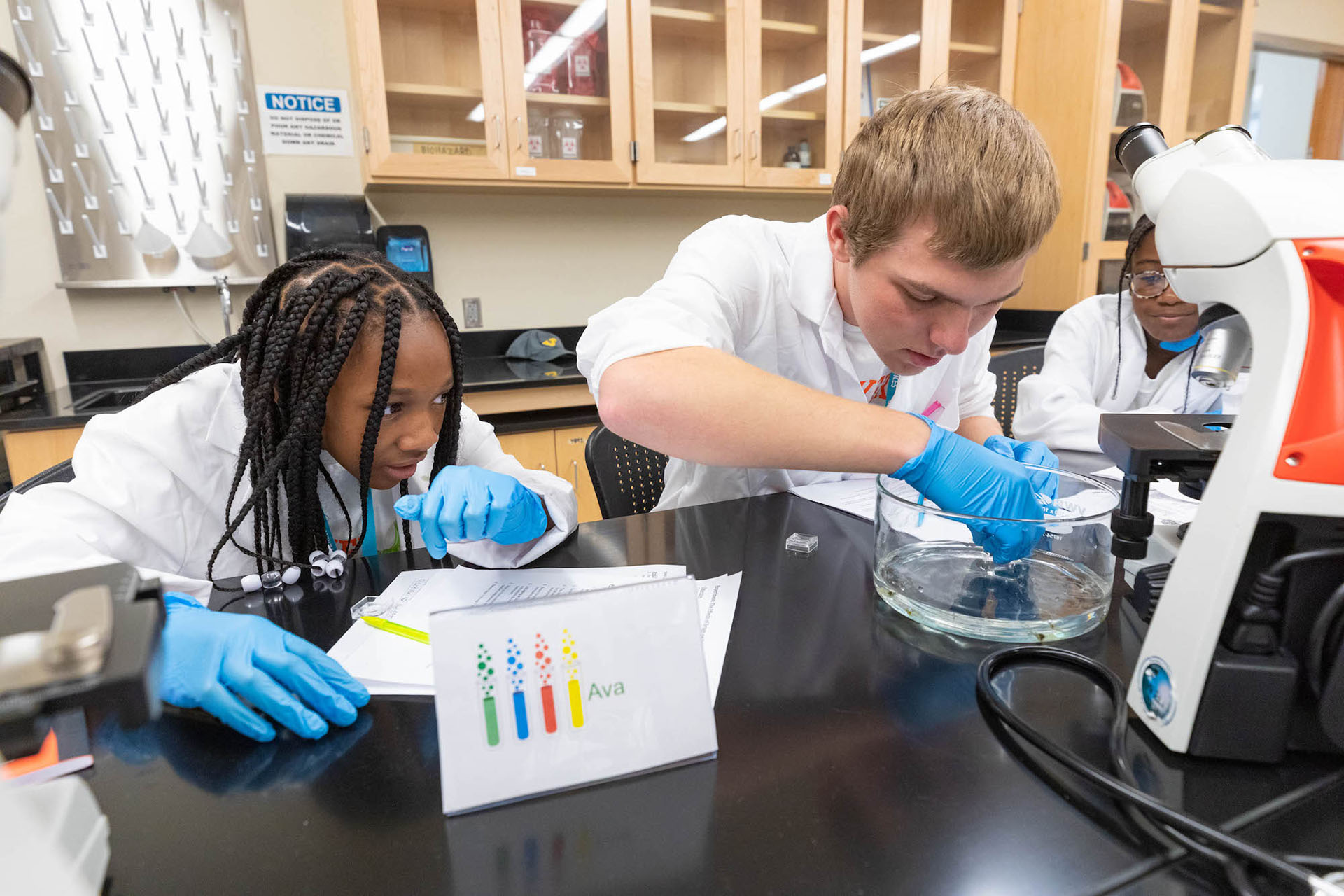
Ava Allen, a rising sixth grader, attended the camp in 2022 and said it was the first time she had done lab experiments and the first time she had visited Fayetteville. Prior to the camp, Allen said she was not as interested in science, but the experience changed her mind. By the fourth day of camp, she expressed a desire to become a dermatologist.
Trinity Bruce, another rising sixth grader, said meeting everyone involved in the camp was her favorite thing. “I’m interested in architecture, but I want to try new things,” she said, noting that she was most proud of herself for dissecting a sheep’s brain earlier in the week, because it meant overcoming her weak stomach.
In 2022, the U of A was awarded $1.25 million from the Science Education Partnership, which is sponsored by the National Institute of General Medical Sciences, a component of the National Institutes of Health. A key component of the five-year grant is a one-week STEAM summer program at the U of A – led by Bailey – that will target rising sixth graders from Reed Elementary in Dumas.
“It’s effective, it’s working,” she said. “Students are becoming interested in the University of Arkansas and they’re attending, so the camp is paying off. That’s what it’s all about for me.”
Learn more about Tameka’s innovative camp in this Short Takes episode.
